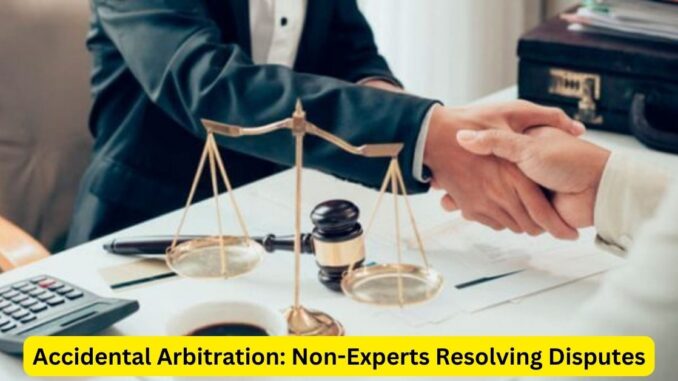
In the realm of dispute resolution, the image of stern-faced judges and learned legal minds often comes to mind. However, a surprising trend is emerging – the concept of non-experts unintentionally stepping into the role of arbitrators and resolving conflicts outside the formal legal system. This accidental arbitration, while unconventional, raises intriguing questions about the nature of conflict resolution and the evolving dynamics of justice.
Imagine a scenario where neighbors find themselves at odds over a property boundary. Rather than engaging in a lengthy and costly legal battle, they turn to a mutual acquaintance known for their impartiality and wisdom. In an informal setting, this mediator listens to both sides, asks pertinent questions, and suggests potential solutions. This inadvertent arbitration allows the parties involved to reach a resolution that satisfies both sides, relying on the trusted judgment of someone without formal legal training.
In a corporate context, colleagues embroiled in a disagreement might turn to a supervisor known for their fairness and interpersonal skills. This unintended arbitrator assesses the situation, analyzes the facts, and facilitates a compromise that restores harmony within the team. This approach showcases how everyday individuals can inadvertently become agents of conflict resolution, leveraging their understanding of human dynamics to achieve mutually beneficial outcomes.
The rise of online communities has also contributed to accidental arbitration. Platforms like forums, social media groups, and niche websites often host discussions that involve disputes between members. In these spaces, regular participants step in as moderators, listening to grievances and guiding conversations toward amicable solutions. This grassroots approach showcases the power of collective wisdom in resolving conflicts.
However, accidental arbitration is not without its challenges. The lack of formal training can sometimes lead to biased judgments or incomplete understanding of legal implications. Moreover, these ad-hoc resolutions might not carry the same legal weight as decisions made through official channels. As a result, there’s a need to strike a balance between the accessibility and informality of accidental arbitration and the structured nature of formal legal proceedings.
This trend also prompts a broader conversation about the role of empathy and emotional intelligence in dispute resolution. Non-expert arbitrators often excel in understanding the emotional nuances underlying conflicts and finding resolutions that go beyond rigid legal interpretations. This underscores the importance of not only legal expertise but also the ability to navigate the intricate web of human emotions.
While accidental arbitration might not replace traditional legal mechanisms, it highlights the need for a more inclusive approach to conflict resolution. It challenges the notion that only professionals trained in law can mediate disputes effectively. It also encourages the legal system to explore innovative ways to integrate non-expert perspectives and alternative forms of resolution.
In a world where disputes can arise in the most unexpected places, accidental arbitration showcases the power of informal mediators to bring about resolutions that resonate with the parties involved. It serves as a reminder that while the legal system plays a vital role, the human touch and personal understanding of conflicts can often be equally impactful in reaching fair and just outcomes.
Leave a Reply